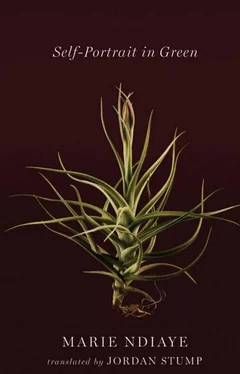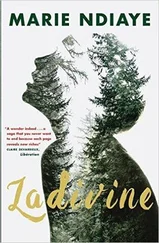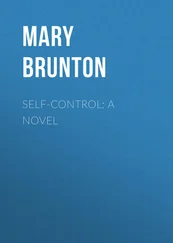One day, one of my father’s sons, a man far older than I, bursts into Ledada while I happen to be dining there. He’s clutching a golf club with both hands. So he’s a golfer, I say to myself, indifferent. Of all my father’s children, he’s the one I dislike the most. He wordlessly raises the club over his head and smashes it down on the counter. My stepmother stands there, motionless and sedate, coldly observing this unpleasant man’s every move. He starts whirling around, brandishing the club before him, mowing down chairs, toppling tables, shattering picture frames. The customers leap up, shout, scatter. My father comes up from the kitchen and stands at the top of the stairs, wrapped in his apron. He looks at his oldest son in silence. He looks at his wife too, but she never so much as glances his way. My father seems abstracted, weary, drained. My stepmother is focused and vigilant. The son drops the club and falls to his knees on the tile floor. His face is wet with tears. He prostrates himself before my father.
“The problem,” I later told my father in Ledada’s ravaged dining room, “is that you have too many children. If every one of your children thinks they have grounds to make you pay for something you’ve done and maybe forgotten, how can you hope to deal with it?”
“I’ve never failed anyone,” my father answered.
“That’s possible. Nevertheless, you have too many children,” I insisted pointlessly, fully aware of my own bad faith.
Because I feared that my father and the woman in green might have a child of their own, or two, or three, and that this would only compound my father’s problems, engulfing all of us, those of his children who feel it in our hearts when some sorrow befalls him. I fear that still, although my friend is no longer a very young woman — does green guard against fertility, I sometimes wonder? No, my friend’s not a young woman anymore, and they still haven’t reproduced. They’ve sold Ledada and gone back to the seed shop, raising pigeons in the back room. Little mauve feathers flutter all around my father wherever he goes. That woman in green, my former friend, is the third to come into my life, and to this day, in 2003, she’s still there, although I almost never see her, out of indolence and spite. I sometimes ask myself: really, what have you got against her? But is it so vital to ask that question, when the answer is obvious? I can’t forgive her for discarding our friendship to take up with my father, a man worn down by too many marriages, too many varied, successive existences, a man who should have elegantly consented to throw in the towel at long last, instead of upsetting the order of the generations, he who had already won so much, and so often. Hard-headed in his emaciation, he’ll come to a pitiable end. His daily rations are those of a child of two. Meanwhile, his wife balloons year after year, to the point that she now has her green dresses hand-sewn, because she can’t find her size in the shops. All the same, there’s no denying it, they exude conjugal bliss. Making them enviable, in the end, in their way — yes, are they not to be envied?
* * *
December 2003 — After the uncertain night, day broke bright and mild. Nothing the Garonne has in store seems too worrisome when the air is blue-tinged and luminous. Several roads around the village are cut off. At eight o’clock the firemen’s siren in La Réole sounds, and that siren, meant to inform us of nothing other than the rise of the water, sends more than one of us into a panic, as we don’t understand what it means. We don’t know, we’ve forgotten, how to interpret it: are we supposed to count the blasts from the beginning, and thus understand that the Garonne has hit ten meters at La Réole (which, for us, means disaster, a catastrophic flood in the offing), or do we count only the short blasts that come after one very long blast, which serves solely as an overture for the counting? We don’t know. A variety of opinions are voiced, in tones sharpened by anxiety. Why do so many men and so few women enjoy this tense atmosphere, this prelude to valor, to heroism? Why do so many women, who’ve been living here forever, aspire only to move to a safe place at last, and so few men? Why do the men say, in spite of the extra work, the exhaustion, the apprehension caused by the threat of a flood, and then sometimes by the flood itself, why do they say, without explanation, “I’ll never leave!”? Why should they see leaving as a sign of failure, when there’s no point in staying?
* * *
2000 — I never met this other woman in green, the fourth or fifth, whose presence in my personal legends eclipses, by its incandescence, some of her more irrefutably real neighbors. I’m not even sure she’s actually a woman dressed in green. In the end, it makes little difference. She remains a pure emblem of a green woman, no matter what. Everything I know of her comes to me from Jenny.
A time came when Jenny found herself at a dead end. She was a little less than fifty years old, and everything that had once been hers, everything she’d worked so hard to succeed at, everything she’d devotedly loved had all flitted away in the space of a year. Her adopted son was wandering the world and refused to see her, her husband had left her, she’d just been laid off. Everything had vanished. She’s a passive and trusting person, and nothing she’d done was really to blame for this ruination. It had simply happened, beside her, without her realizing, and when she woke up it was too late to hope she might recover what was lost.
When I met her she was tall and thin. She wore her hair in a loose bun, and that hair was artificially of the palest blond. Is hair color a reflection of some moral quality, of goodness and innocence, of those virtues’ opposite? Obviously not. The pallor of Jenny’s hair in no way expressed what she was. Nevertheless, even mired in distress, incomprehension, the terror of poverty, she went on carefully bleaching her hair, and gathering it up with just the degree of slackness she liked, so that every day two or three strands would come loose and fall over her cheeks, allowing her, always with the same slow, reflective gesture, unsullied by coquetry or ostentation, to tuck them back behind her ear. She was never concerned about knowing exactly what she looked like. As an image of her self, she wanted to know only the timeless harmony of that minuscule gesture, only the beauty of two fingers lifting up a lock of almost white hair.
* * *
March 11, 2001 — Jenny is moving back in with her parents, in the country, since she can’t pay her rent. They greet her in pained, awkward silence. They can scarcely believe she has failed so utterly, she whom they were once so intimidated to visit, fearing they might not measure up to her prosperity. She knows what they’re wondering, bewildered but severe: does our daughter still have some scrap of dignity left? They allow the first name of the adopted son, their only grandchild, to escape their pinched, pursed lips, and then all of a sudden they’re heaving with sobs. Jenny says nothing: what is there to say, she thinks, in the face of this disaster? Is it a disaster? Or only life? Before her hiccupping old parents, before her old parents who’ve never been very tender or very clement, or benevolent or, in any way, very tolerant, a sort of serenity descends over her. Nothing sadder can happen to the three of them than this: two stiff, prickly old people weeping before their careworn daughter, weeping because a man who is their grandchild, although he was born to an unknown woman in a place so far away they’ll never go there, has decided to have nothing more to do with them, because he despises and hates them. That man used to be a very little boy, who loved his holidays in this countryside, who hopped and rolled around the yard, who considered this yard his own, without qualm or reserve, and now he’s fled, burning behind him what he once seemed to love, now he’s become a faithless and mysterious person, someone you no longer know, but who seems to know you so well that he refuses to put up with you any longer. Jenny raises her eyes to the austere little house, the gray skies, then looks back down at her parents’ tear-streaked faces, and something like an understanding of what the son must be feeling runs fleetingly through her. She knows all this far too well, she tells herself. These poor damp-eyed people are her family. That fills her with a sort of disgust, an impotent exasperation. She’d like these people, who are undeniably her family, and who look on her in the same way, to evaporate by some miracle, without awareness or pain, and leave her alone, and free of any such bond.
Читать дальше












